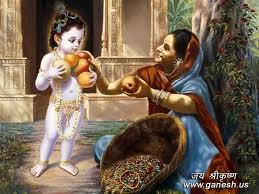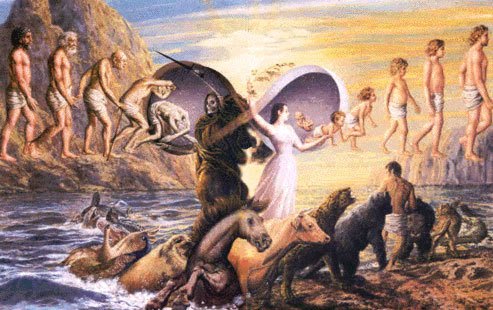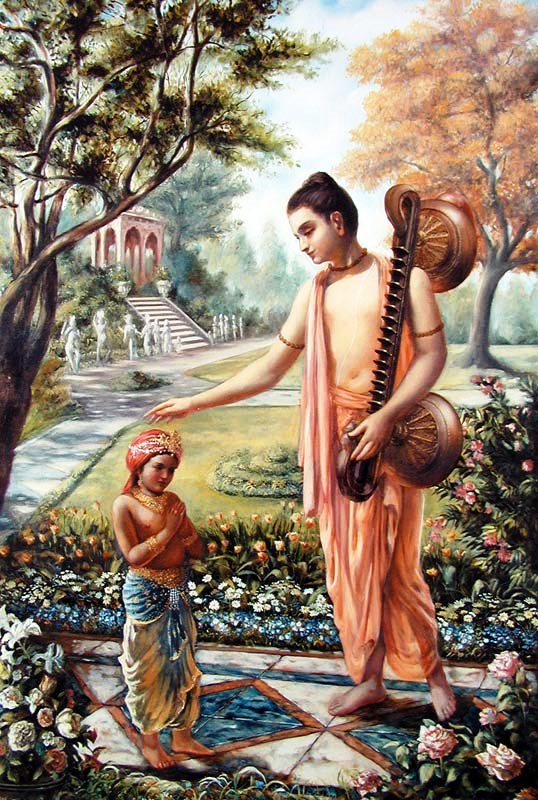Since God is
omnipresent, present everywhere, how can He not be present in the form the
deity? There are many pastimes of deities doing amazing things. Have you not hear
of the pastime of the deity Sakshi Gopal? That pastime is told by Srila
Prabhupada as follows:
In India, there is one temple called Sakshi-Gopala (Krishna is often called Gopala). The Gopala murti or statue was at one time located in a temple in Vrindavana. Once two brahmanas, one old and one young, went to visit Vrindavana on a pilgrimage. It was a long trip, and in those days there were no railways, so travelers underwent many hardships. The old man was much obliged to the youth for helping him on the journey, and upon arriving in Vrindavana, he said to him: "My dear boy, you have rendered me so much service, and I am much obliged to you. I would like very much to return that service and give you some reward."
"My dear sir, "the youth said, "you are an old man just like my father. It is my duty to serve you. I don't require any reward."
"No, I'm obliged to you, and I must reward you," the old man insisted. He then promised to give the young man his young daughter in marriage. The old man was a very rich man, and the youth, although a learned brahmana, was very poor.
Considering this, the youth said, "Don't promise this, for your family will never agree. I am such a poor man, and you are aristocratic, so this marriage will not take place. Don't promise this way before the Deity."
The conversation was taking place in the temple before the Deity of Gopala Krishna, and the young man was anxious not to offend the Deity. However, despite the youth's pleas, the old man insisted on the marriage. After staying in Vrindavana for some time, they finally returned home, and the old man informed his eldest son that his young sister was to be married to the poor brahmana youth.
The eldest son became very angry. "Oh, how have you selected that pauper as husband for my sister? This cannot be."
The old man's wife also came to him and said, "If you marry our daughter to that boy, I shall commit suicide."
The old man was thus perplexed. After some time, the brahmana youth became very anxious. "He has promised to marry his daughter to me, and he made that promise before the Deity. Now he is not coming to fulfill it." He then went to see the old man to remind him of his promise.
"You promised before Lord Krishna," the youth said, "and you are not fulfilling that promise. How is that?"
The old man was silent. He began praying to Krishna, for he was perplexed. He didn't want to marry his daughter to the youth and cause such great trouble within his family.
In the meantime the elder son came out and began to accuse the brahmana youth. "You have plundered my father in the place of pilgrimage. You gave him some intoxicant and took all his money, and now you are saying that he has promised to offer you my youngest sister. You rascal!"
In this way there was much noise, and people began to gather. The youth could understand that the old man was still agreeable but that the family was making it difficult for him. People began to gather about because of the noise which the elder son was raising, and the brahmana youth began to exclaim to them that the old man made this promise before the Deities but that he could not fulfill it because the family was objecting.
The eldest son, who was an atheist, suddenly interrupted the youth and said, "You say that the Lord was witnessing. Well, if He comes and bears witness to this promise of my father's, you can have my sister in marriage."
The youth replied, "Yes, I shall ask Krishna to come as a witness."
He was confident that God would come. An agreement was then made
before everyone that the girl would be given in marriage if Krishna came from Vrindavana as a witness to the old man's promise.
The brahmana youth returned to Vrindavana and began to pray to Gopala Krishna. "Dear Lord, You must come with me." He was such a staunch devotee that he spoke to Krishna just as one would speak to a friend. He was not thinking that the Gopala was a mere statue or image, but he considered Him to be God Himself.
Suddenly the Deity spoke to him: "How do you think that I can go with you? I am a statue. I can't go anywhere."
"Well, if a statue can speak, he can also walk," the boy replied.
"All right then," the Deity said finally. "I shall go with you, but on one condition. In no case shall you look back to see Me. I will follow you, and you will know that I am following by the jingle of My leg bangles."
The youth agreed, and in this way they left Vrindavan to go to the other town. When the trip was nearly over, just as they were about to enter his home village, the youth could no longer hear the sound of the bangles, and he began to fear. "Oh, where is Krishna?"
Unable to contain himself any longer, he looked back. He saw the statue standing still. Because he looked back, it would go no further. He immediately ran into the town and told the people to come out and see Krishna who had come as a witness. Everyone was astounded that such a large statue had come from such a distance, and they built a temple on the spot in honor of the Deity, and today people are still worshiping Sakshi-Gopala, the Lord as a witness.
We should therefore conclude that because God is everywhere, He is also in His statue, in the image made of Him. If Krishna is everywhere, as even the impersonalists admit, then why isn't He in His image? Whether an image or statue speaks to us or not is dependent on the degree of our devotion. But if we choose to see the image merely as a piece of wood or stone, Krishna will always remain wood or stone for us. Krishna is everywhere, but as we advance in spiritual consciousness we can begin to see Him as He is. If we put a letter into a mailbox, it will go to its destination because the mailbox is authorized. Similarly, if we worship an authorized image of God, our faith will have some effect. If we are prepared to follow the various rules and regulations -- that is to say, if we become qualified -- it is possible to see God anywhere and everywhere. When a devotee is present, Krishna, by His omnipresent energies, will manifest Himself anywhere and everywhere, but when His devotee is not there, He will not do this.
------
We are very much indebted to Srila Prabhupada for revealing to us the wonderful history of Sakshi Gopal. When you become fully qualified like the brahmana in the above story, you will see how Krishna is engaged in so many varieties of activities. Krishna can fully manifest Himself anywhere He chooses to because everything is His energy. It is simply up to us to now develop the eyes to see Him. But until then we can render Him personal service in the form of the deity.
Sankarshan Das Adhikari
In India, there is one temple called Sakshi-Gopala (Krishna is often called Gopala). The Gopala murti or statue was at one time located in a temple in Vrindavana. Once two brahmanas, one old and one young, went to visit Vrindavana on a pilgrimage. It was a long trip, and in those days there were no railways, so travelers underwent many hardships. The old man was much obliged to the youth for helping him on the journey, and upon arriving in Vrindavana, he said to him: "My dear boy, you have rendered me so much service, and I am much obliged to you. I would like very much to return that service and give you some reward."
"My dear sir, "the youth said, "you are an old man just like my father. It is my duty to serve you. I don't require any reward."
"No, I'm obliged to you, and I must reward you," the old man insisted. He then promised to give the young man his young daughter in marriage. The old man was a very rich man, and the youth, although a learned brahmana, was very poor.
Considering this, the youth said, "Don't promise this, for your family will never agree. I am such a poor man, and you are aristocratic, so this marriage will not take place. Don't promise this way before the Deity."
The conversation was taking place in the temple before the Deity of Gopala Krishna, and the young man was anxious not to offend the Deity. However, despite the youth's pleas, the old man insisted on the marriage. After staying in Vrindavana for some time, they finally returned home, and the old man informed his eldest son that his young sister was to be married to the poor brahmana youth.
The eldest son became very angry. "Oh, how have you selected that pauper as husband for my sister? This cannot be."
The old man's wife also came to him and said, "If you marry our daughter to that boy, I shall commit suicide."
The old man was thus perplexed. After some time, the brahmana youth became very anxious. "He has promised to marry his daughter to me, and he made that promise before the Deity. Now he is not coming to fulfill it." He then went to see the old man to remind him of his promise.
"You promised before Lord Krishna," the youth said, "and you are not fulfilling that promise. How is that?"
The old man was silent. He began praying to Krishna, for he was perplexed. He didn't want to marry his daughter to the youth and cause such great trouble within his family.
In the meantime the elder son came out and began to accuse the brahmana youth. "You have plundered my father in the place of pilgrimage. You gave him some intoxicant and took all his money, and now you are saying that he has promised to offer you my youngest sister. You rascal!"
In this way there was much noise, and people began to gather. The youth could understand that the old man was still agreeable but that the family was making it difficult for him. People began to gather about because of the noise which the elder son was raising, and the brahmana youth began to exclaim to them that the old man made this promise before the Deities but that he could not fulfill it because the family was objecting.
The eldest son, who was an atheist, suddenly interrupted the youth and said, "You say that the Lord was witnessing. Well, if He comes and bears witness to this promise of my father's, you can have my sister in marriage."
The youth replied, "Yes, I shall ask Krishna to come as a witness."
He was confident that God would come. An agreement was then made
before everyone that the girl would be given in marriage if Krishna came from Vrindavana as a witness to the old man's promise.
The brahmana youth returned to Vrindavana and began to pray to Gopala Krishna. "Dear Lord, You must come with me." He was such a staunch devotee that he spoke to Krishna just as one would speak to a friend. He was not thinking that the Gopala was a mere statue or image, but he considered Him to be God Himself.
Suddenly the Deity spoke to him: "How do you think that I can go with you? I am a statue. I can't go anywhere."
"Well, if a statue can speak, he can also walk," the boy replied.
"All right then," the Deity said finally. "I shall go with you, but on one condition. In no case shall you look back to see Me. I will follow you, and you will know that I am following by the jingle of My leg bangles."
The youth agreed, and in this way they left Vrindavan to go to the other town. When the trip was nearly over, just as they were about to enter his home village, the youth could no longer hear the sound of the bangles, and he began to fear. "Oh, where is Krishna?"
Unable to contain himself any longer, he looked back. He saw the statue standing still. Because he looked back, it would go no further. He immediately ran into the town and told the people to come out and see Krishna who had come as a witness. Everyone was astounded that such a large statue had come from such a distance, and they built a temple on the spot in honor of the Deity, and today people are still worshiping Sakshi-Gopala, the Lord as a witness.
We should therefore conclude that because God is everywhere, He is also in His statue, in the image made of Him. If Krishna is everywhere, as even the impersonalists admit, then why isn't He in His image? Whether an image or statue speaks to us or not is dependent on the degree of our devotion. But if we choose to see the image merely as a piece of wood or stone, Krishna will always remain wood or stone for us. Krishna is everywhere, but as we advance in spiritual consciousness we can begin to see Him as He is. If we put a letter into a mailbox, it will go to its destination because the mailbox is authorized. Similarly, if we worship an authorized image of God, our faith will have some effect. If we are prepared to follow the various rules and regulations -- that is to say, if we become qualified -- it is possible to see God anywhere and everywhere. When a devotee is present, Krishna, by His omnipresent energies, will manifest Himself anywhere and everywhere, but when His devotee is not there, He will not do this.
------
We are very much indebted to Srila Prabhupada for revealing to us the wonderful history of Sakshi Gopal. When you become fully qualified like the brahmana in the above story, you will see how Krishna is engaged in so many varieties of activities. Krishna can fully manifest Himself anywhere He chooses to because everything is His energy. It is simply up to us to now develop the eyes to see Him. But until then we can render Him personal service in the form of the deity.
Sankarshan Das Adhikari












